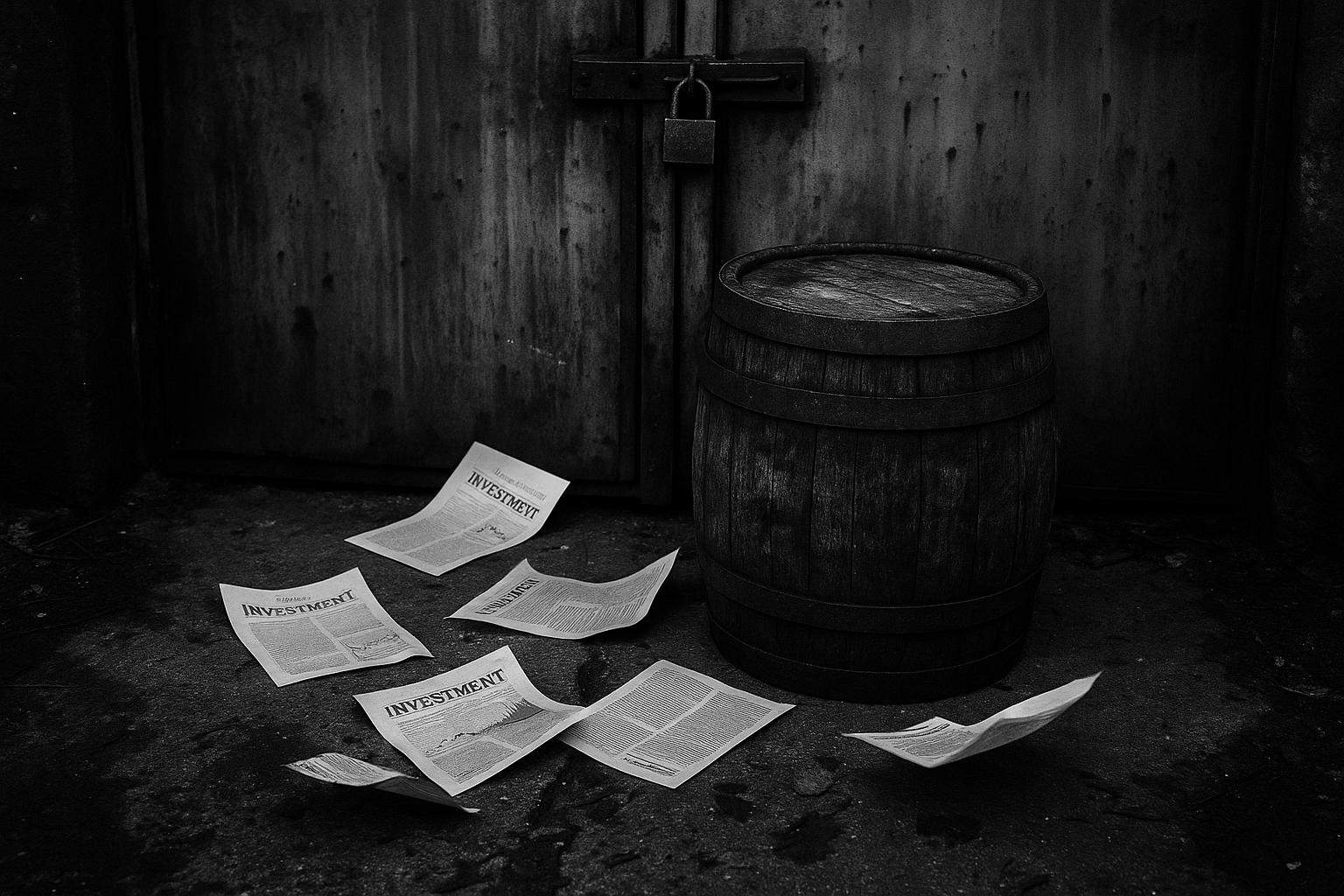Readers who bought bonds and cask investments marketed by Nicholas James Finance are warned recovery looks bleak after Whisky&Co entered liquidation and Companies House opened strike‑off proceedings against Linc Drinks, exposing disputed warehouse claims, bold valuation promises and potential breaches of investor eligibility checks.
Tony Hetherington has sounded a stark warning to readers who bought into investments promoted by Nicholas James Finance Ltd after two of the firms it marketed — Linc Drinks Ltd and Whisky&Co Ltd — have collapsed or face regulatory action, leaving investors facing an uphill battle to recover money. “I am afraid the picture does not look good,” he wrote in the Financial Mail on Sunday after reporting that Whisky&Co had gone into liquidation and that Companies House has opened strike‑off proceedings against Linc Drinks. (This column passed its evidence to the Financial Conduct Authority earlier in the year, prompting the regulator to open enquiries.)
The sales agent at the centre of the controversy, Nicholas James Finance, was not authorised by the Financial Conduct Authority to sell investments to the general public, according to the Mail on Sunday investigation. Companies House filings identify Ashley James Wilkinson as the director and person with significant control of Nicholas James Finance, and the company is registered in London. The firm appears to have relied on a legal exemption that permits the sale of high‑risk instruments to wealthy or sophisticated investors, but Hetherington reported that the firm did not adequately check whether purchasers met the necessary criteria before offering them risky bonds and cask investments.
The claims made for Linc Drinks were particularly bold. Prospectuses presented to potential investors sought only a relatively small sum of money but insisted Linc Drinks would reach a valuation of £150 million within a year and even hinted at a takeover by a household name in spirits — assertions Hetherington described as implausible. Companies House records show Linc Drinks was incorporated in 2017 and that filings name Sam Williams as a director appointed in 2024, but official filings do not verify commercial representations made to investors and the company has attracted a compulsory strike‑off notice for failing to file required documentation.
Problems with Whisky&Co’s pitch went beyond optimistic forecasts. Hetherington reported that Whisky&Co sold casks as investments on the basis that they would be stored in HMRC‑approved bonded warehouses in Scotland; in reality, the casks were said to be Irish whiskey held in Ireland. That distinction matters: HMRC’s rules on excise‑warehousing and duty suspension are jurisdictional, and goods held in Irish bonded warehouses fall under Irish excise procedures rather than HMRC oversight. Without clear, verifiable bonded‑warehouse paperwork showing UK storage, investor claims to HMRC protections are weak. Companies House records confirm Whisky&Co’s incorporation and filings, and name Ashley Wilkinson as its director.
Investors were also offered projections of annual returns of up to 12 per cent and reassurances of market access via connections with auction houses — claims Hetherington says were promoted by the sales firm. An auctioneer reportedly named in promotional material denied any close relationship when contacted, undermining another strand of the firms’ marketing narrative. Taken together, the combination of high return promises and disputed commercial links is the crux of why regulatory and insolvency professionals see the situation as serious.
Developments over the summer hardened the outlook. Whisky&Co went into liquidation on 5 August and Nicholas James Finance applied for strike‑off in late July, while Companies House has begun proceedings to remove Linc Drinks from the register after missed filings. Those formal steps, together with the lack of contactability of named directors at advertised business addresses, leave investors with limited immediate recourse and increase the likelihood of formal regulatory or insolvency action.
For people who bought casks or bonds, the legal and practical position is complicated. An Insolvency Service precedent in a separate cask case showed that where a liquidator or Official Receiver concludes a company does not own the goods held in bonded warehouses, the liquidator can disclaim warehouse contracts — effectively renouncing them as onerous — and advise customers to contact warehouses directly about beneficial ownership. That outcome does not guarantee recovery of money, because title, contractual arrangements and the paperwork evidencing bonded storage all determine whether customers remain beneficial owners or become unsecured creditors of an insolvent company. HMRC guidance on excise warehouses makes clear how important documentary proof of bonded storage and formal warehousekeeper responsibilities are to those determinations.
Given those legal mechanics, Hetherington and official notices point to practical steps for concerned investors: secure and preserve all documentation (contracts, invoices, warehouse receipts, emails and any promotional material), check Companies House filings for official records of officers and charges, contact the named warehouses to establish the physical and legal status of any casks, and notify the FCA and Insolvency Service of potential claims. Investors may also need to obtain specialist legal advice about whether they are treated as beneficial owners of product in bonded warehouses or as creditors of the companies that sold them the investments. The Mail on Sunday has reported the case to the FCA and invited responses from the firms’ directors, but the paper says it received no reply from the principal behind the group.
The unfolding affair underlines two wider points for anyone tempted by retail investments in alternative assets: statutory company filings show legal existence and officers but do not endorse commercial claims, and jurisdictional details about where goods are held and under whose bonded authority they sit can be decisive if things go wrong. Investors affected by these events now confront a combination of regulatory enquiry, insolvency procedure and the often slow business of proving ownership — a combination that, in similar past cases, has left many recovering only a fraction of what they invested.
 Reference Map:
Reference Map:
Reference Map:
- Paragraph 1 – [1], [2]
- Paragraph 2 – [1], [3]
- Paragraph 3 – [1], [4]
- Paragraph 4 – [1], [5], [6]
- Paragraph 5 – [1], [2]
- Paragraph 6 – [1], [4], [5], [3]
- Paragraph 7 – [1], [7], [6]
- Paragraph 8 – [1], [7], [4], [6]
- Paragraph 9 – [1], [4], [5]
Source: Noah Wire Services
- https://www.dailymail.co.uk/money/experts/article-15006169/TONY-HETHERINGTON-warned-whisky-firm-cause-hangover.html?ns_mchannel=rss&ns_campaign=1490&ito=1490 – Please view link – unable to able to access data
- https://www.dailymail.co.uk/money/experts/article-15006169/TONY-HETHERINGTON-warned-whisky-firm-cause-hangover.html?ns_mchannel=rss&ns_campaign=1490&ito=1490 – Tony Hetherington’s Mail on Sunday column details how Nicholas James Finance promoted investments in Linc Drinks and Whisky&Co, selling high‑risk bonds and whisky casks to retail investors despite lacking FCA authorisation. He reports Linc Drinks’ ambitious valuation claims, alleged links to auctioneer Bonhams which Bonhams denied, and that Whisky&Co purported casks were actually Irish whiskey held in Ireland. Companies House action and a Whisky&Co liquidation are described, and the writer says he passed evidence to the Financial Conduct Authority, which has opened enquiries. The piece warns readers about mis‑selling, director contact failures, and the difficulty of recovering investor funds too.
- https://find-and-update.company-information.service.gov.uk/company/12997183 – The Companies House entry for Nicholas James Finance Ltd (company number 12997183) shows an active private limited company registered at 20‑22 Wenlock Road, London. The register names Ashley James Wilkinson as director and person with significant control, with correspondence at the listed address. Company filing documents and accounts are downloadable from the official page, which records incorporation and SIC codes describing information services. The public record does not show FCA authorisation; Companies House only records statutory filings. The page is therefore a primary source for director, registered office and corporate filing details relating to Nicholas James Finance Ltd and filings.
- https://find-and-update.company-information.service.gov.uk/company/10620719 – The Companies House entry for Linc Drinks Ltd (company number 10620719) lists it as a private limited company incorporated on 15 February 2017 and registered at 17 Hanover Square, London. Filings show its most recent accounts and confirmation statements, previous name UGO International Limited, and Sam Williams recorded as a director appointed 5 March 2024. The public filing history includes document uploads and an address change; external commercial databases also flag a compulsory strike‑off notice. Companies House records provide official corporate details including officers, registered office and filing history but do not itself verify trading claims or investor representations or endorsements.
- https://find-and-update.company-information.service.gov.uk/company/14592302 – Companies House’s public record for Whisky&Co Ltd (company number 14592302) shows incorporation on 14 January 2023 with registered offices in Harpenden and Ashley James Wilkinson named as director and person with significant control. The entry lists micro‑entity accounts filed to January 2024, a registered charge recorded in November 2023 and recent changes of registered address. The company’s filing history and officers are visible and downloadable from the official service. This source confirms the corporate presence and formal filings of Whisky&Co Ltd, but it does not assess commercial claims about cask ownership, storage location or investment performance or customer account validity records.
- https://www.gov.uk/guidance/apply-to-be-an-owner-of-excise-goods-held-in-an-excise-warehouse – HMRC guidance on excise warehouses and tax warehousing explains how duty‑suspended alcoholic goods are held in authorised warehouses, the responsibilities of warehousekeepers, and the legal framework governing receipt, storage and removal of excise goods. The guidance clarifies that owners and warehousekeepers must follow EMCS movement procedures, record stock entries and that VAT and duty liabilities arise on removal to home use. Crucially, warehousing and excise authorisation are jurisdictional: goods stored in Ireland fall under Irish excise rules rather than HMRC oversight, so claims about casks being ‘HMRC‑approved in Scotland’ require documentary proof of UK warehousing and formal bonded warehouse paperwork.
- https://www.gov.uk/government/publications/cask-whisky-ltd-an-update-for-customers – The Insolvency Service notice about Cask Whisky Ltd explains that following a High Court winding‑up order the Official Receiver was appointed liquidator and determined the company did not own the casks held in bonded warehouses. The Official Receiver intends to disclaim the contracts the company held with warehouses, meaning the liquidator will renounce those agreements as onerous property. The guidance clarifies that customers remain the beneficial owners of the whisky and should contact warehouses directly. The notice sets out practical steps, named warehouse contacts and explains how disclaimer decisions affect the contractual position of cask holders and creditors and remedies.
Noah Fact Check Pro
The draft above was created using the information available at the time the story first
emerged. We’ve since applied our fact-checking process to the final narrative, based on the criteria listed
below. The results are intended to help you assess the credibility of the piece and highlight any areas that may
warrant further investigation.
Freshness check
Score:
8
Notes:
The narrative is recent, with the article dated August 17, 2025. The collapse of Whisky&Co Ltd into liquidation on August 5, 2025, and the strike-off proceedings against Linc Drinks Ltd in late July 2025, align with the timeline. However, similar issues with whisky cask investment firms have been reported earlier in 2025, such as the liquidation of Cask Whisky Ltd on October 8, 2024. ([gov.uk](https://www.gov.uk/government/publications/cask-whisky-ltd-an-update-for-customers?utm_source=openai)) This suggests that while the specific companies mentioned are recent, the broader issue has been ongoing. The article appears to be based on a press release, which typically warrants a high freshness score.
Quotes check
Score:
7
Notes:
The article includes direct quotes attributed to Tony Hetherington. A search for these quotes reveals no exact matches in earlier publications, indicating they may be original or exclusive content. However, without access to the original press release, it’s challenging to confirm the originality of the quotes.
Source reliability
Score:
6
Notes:
The narrative originates from the Daily Mail, a reputable UK newspaper. However, the article is based on a press release, which may indicate a single-source narrative. The companies mentioned, such as Nicholas James Finance Ltd, Linc Drinks Ltd, and Whisky&Co Ltd, have limited online presence, raising questions about their verifiability. For instance, Companies House records confirm the incorporation of Whisky&Co Ltd, but detailed information is scarce. ([companiesintheuk.co.uk](https://www.companiesintheuk.co.uk/ltd/whiskyco?utm_source=openai)) This lack of verifiable information about the companies involved suggests potential issues with source reliability.
Plausability check
Score:
5
Notes:
The claims about the collapse of Whisky&Co Ltd and the strike-off proceedings against Linc Drinks Ltd are plausible, given the recent developments in the whisky investment sector. However, the lack of detailed information about the companies involved and the reliance on a single press release raise concerns about the narrative’s credibility. The tone and language used in the article are consistent with typical journalistic reporting, but the absence of corroborating sources makes the claims less certain.
Overall assessment
Verdict (FAIL, OPEN, PASS): OPEN
Confidence (LOW, MEDIUM, HIGH): MEDIUM
Summary:
The narrative presents recent developments in the whisky investment sector, including the liquidation of Whisky&Co Ltd and the strike-off proceedings against Linc Drinks Ltd. While the timeline aligns with recent events, the reliance on a single press release and the limited verifiability of the companies involved raise concerns about the narrative’s credibility. Further independent verification is recommended to confirm the accuracy of the claims made.













